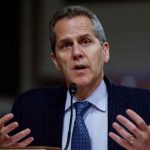Getty/David Greedy
- Israel is leading the world in terms of its vaccination rate, with nearly 20 people in every hundred having received a dose.
- The global effort to vaccinate people against COVID-19 began in early December. Since then, more than 40 countries have started administering coronavirus jabs among their populations.
- The United Arab Emirates has achieved the second-highest vaccination rate at 8.98 per 100 people, while Bahrain comes third at 4.25.
- The United Kingdom, which became the first country to administer a coronavirus vaccine on December 8
- France, where the government has been heavily criticized for a sluggish start to its vaccine rollout, lags behind most European countries with a vaccination rate of 0.07 per 100 people.
- The vaccination data illustrates that rich and middle-income countries have secured almost all the available vaccine supply to date.
- Visit Business Insider’s homepage for more stories.
The global effort to vaccinate people against COVID-19 began in early December. Since then, more than 40 countries have started administering coronavirus jabs among their populations.
Israel is leading the world in terms of its vaccination rate, with nearly 20 people in every hundred having received a dose, according to data compiled by Our World In Data, a research website affiliated with Oxford University.
Statistics compiled by Our World in Data from official sources listed above. Data updated on January 7.
That figure is significantly higher than any other country in the world, an effort which has been attributed to the country’s digitized healthcare system and the government’s early success in purchasing enough doses of the Pfizer and Moderna vaccines to cover the whole population.
The United Arab Emirates has achieved the second-highest vaccination rate at 8.98 per 100 people, while Bahrain comes third at 4.25.
The United Kingdom, which became the first country to administer a coronavirus vaccine on December 8, had administered 1.91 jabs per 100 people by January 3, while the United States had administered 1.79 doses by January 7.
Meanwhile, France, which was criticized after administering just 516 jabs in the first 6 days after it rolled out the Pfizer/BioNTech vaccine, still lags behind other European countries in its vaccination efforts, with a vaccination rate of 0.07 per 100 people.
President Emmanuel Macron’s government has been wary of making it appear that the vaccine is being forced on the people because polls have indicated that it is one of the most vaccine-skeptical in the world. An Ipsos poll conducted in December indicated that only 40% of France’s population wanted to take the vaccine.
Our World in Data recorded the number of people who have received a first dose of a COVID-19 vaccine. The most widely used vaccine candidates, including the Pfizer/BioNTech and Moderna jabs, require two doses administered over a period of weeks.
The vaccination data illustrates that rich and middle-income countries have secured almost all the available vaccine supply to date.
India plans to launch its vaccine rollout on January 16. John Nkengasong, head of the Africa Centres for Disease Control and Prevention, said in an article for Nature that vaccinations in Africa are not likely to begin until mid-2021.
COVAX, an initiative to promote the equitable distribution of COVID-19 jabs among rich and developing countries, said this week that it had secured $6 billion to finance the purchase and distribution of vaccines to 92 developing countries that do not have the resources to buy vaccines themselves, Reuters reported.
Powered by WPeMatico






